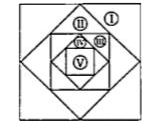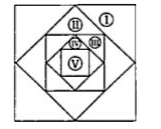In the figure shown square II is formed by joining the mid-points of square I

and so on . In this way total five squares are drawn . The sides of the square I is 'a' cm.
What is the perimeter of all the five squres ?
A)(4√2+1)a(√2+1)
B)(4√2−1)a(√2+1)
C)56a
D)(7+3√2)a
The correct Answer is:D
Step by step video, text & image solution for In the figure shown square II is formed by joining the mid-points of square I and so on . In this way total five squares are drawn . The sides of the square I is 'a' cm. What is the perimeter of all the five squres ? by Maths experts to help you in doubts & scoring excellent marks in Class 14 exams.
Topper's Solved these Questions
- BOOK - ARIHANT SSCCHAPTER - MENSURATIONEXERCISE - TEST OF YOUR LEARNING18videos
MENSURATION
- BOOK - ARIHANT SSCCHAPTER - MENSURATIONEXERCISE - EXERCISE (LEVEL 1)55videos
MENSURATION
- BOOK - ARIHANT SSCCHAPTER - LOGARITHM EXERCISE - EXERCISE LEVEL 219videos
LOGARITHM
- BOOK - ARIHANT SSCCHAPTER - MIXED GRAPHEXERCISE - Higher Skill Level Questions15videos
MIXED GRAPH
Similar Questions
Knowledge Check
- Question 1 - Select One
In the figure shown square II is formed by joining the mid-points of square II

and so on . In this way total five squares are drawn . The sides of the square I is 'a' cm.
What is the total area of all the five squares ?A(4√2−1)a2(4√2−1)B(4√2−1)a24(√2−1)C3116a3Dnone of these - Question 2 - Select One
Each side of a square measures 5.6 cm. The perimeter of the square is ______ .
A23.5 cmB22 cmC22.4 cmD22.4cm2 - Question 3 - Select One
What should be side of square (in cm.) if its perimeter is equal to area?
A6cmB2cmC4 cmD8 cm
Show that the quadrilateral, formed by joining the mid-points of the sides of a square is also a square.
View SolutionIf one side of a square is 4 cm, then what will be its area and perimeter?
View SolutionThe length of side of a square is 'a' metre. A second square is formed by joining the middle points of this square. Then a third square is formed by joining the middle points of the sides of the second square and so on. Then, the sum of the areas of squares which carried upto infinity, is
View SolutionIf the perimeter of a square is 44 cm, what is the diagonal (in cm) of the square ?
View SolutionIf the perimeter of a square is 44 cm, what is the diagonal (in cm) of the square ?
View Solution
